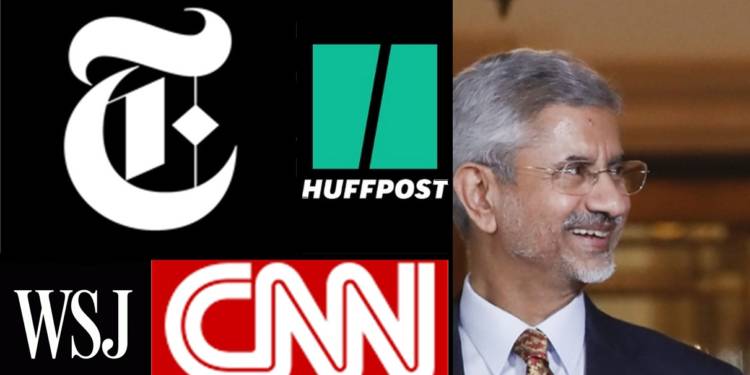PM Modi’s recent tour to the United States of America has certainly been the major focus of Indian media over the past few weeks. Whether it be the outreach program ‘Howdy, Modi’ or PM’s speech at the 74th UNGA, the tour surely indicated towards India’s plans to become a proactive global contributor. Laying the groundwork for the historic state visit behind the scenes was former Foreign Secretary and current Minister of External Affairs Dr S Jaishankar, who by using his vast experience as a career diplomat has certainly given an edge to the office.
Dr S Jaishankar over the last few days has been busy in making a strategic outreach to the “Think Tank” circuit in Washington DC to give final touches to PM Modi’s efforts.
According to a report in Times of India, the former Foreign Secretary and Ambassador to the US, Dr Jaishankar, in a span of 72 hours, met five of Washington DC’s most prestigious Think Tanks: Carnegie Endowment for International Peace, Atlantic Council, Center for Strategic and International Studies, The Brookings Institution, and the Heritage Foundation.
He had also earlier engaged with the Center for Foreign Relations and Asia Society in New York on the sidelines of UN General Assembly.
With more than 1800 Think Tanks across the country, Think Tanks certainly are a critical part of American policy vision and an outreach program focussing on them is surely poised to be more beneficial than superficial media interactions with their limited credibility.
The vile anti-India rhetoric being propagated by foreign media might also have motivated the External Affairs Minister to steer clear of the nefarious agenda and bank upon more influential and certainly more credible Think Tanks in Washington DC.
Along with keeping India’s views on various global opportunities, challenges and common democratic values, Minister of External Affairs also used this opportunity to streamline doubts and misconceptions surrounding the recent legislative developments in the Indian region of Jammu and Kashmir.
“I think it’s important to have a historical context to judge these remarks. This is not a conversation that began on August 5. These are their policies and their actions which began the day Kashmir acceded to India with Pakistani invaders threatening to burn down Srinagar. Please look at the history of Kashmir,” Dr Jaishankar said during an interaction with a Think Tank.
Speaking about Indo-China relationship, he said “Our intention obviously is to progress our relations with China. We are very clear on that and we get the sense that they too would like to see the relations become better and substantive,” Dr Jaishankar said in response to a question.
“On lot of the issues which different countries face with China, frankly, we would weigh the issues on their merit and largely take a bilateral approach,” he added.
Responding to a question on India’s position of Pakistan occupied Kashmir, Dr Jaishankar reiterated “The point I was making was a very simple one. My sovereignty and my jurisdiction is laid out by my maps. My maps have been there for 70 years. That’s my claim. And naturally, if I have a claim, as you would have a claim, as anybody would have a claim, we would hope one day that if there are territories in your claim of which you don’t have physical jurisdiction one day, you will. It’s as simple as that”.
“India had two centuries of humiliation by the West in its predatory form it came to India in the mid-18th century. An economic study tried to estimate how much British took out of India, it ended up at a number of $45 trillion in today’s value,” Dr Jaishankar said while digressing from the long-standing Indian policy of passive discourse to taking a more active and aggressive position.
Dr Jaishankar’s efforts are also poised to further catalyse growth and organisation of the Indo-American community to bear the flag of friendship between the two democracies. Indian Americans, who have been mostly apathetic to politics, have started taking interest in the political discourse in the United States. Backed by their tremendous economic prosperity, Indian-Americans remain one of the most well off ethnic groups with respect to per-capita income in the United States.
With the amount of influence wielded by these Think Tanks and other lobbies, these outreach efforts by Dr S Jaishankar are sure to have many-fold returns in India’s favour.
The impact of PM Modi and Dr Jaishankar’s efforts is already evident with the response of the International community against meek Pakistani attempts to churn dissension around legislative developments in Jammu, Kashmir and Ladakh. Nonetheless, with this deep and high-level policy engagement, India is certainly poised to further solidify its diplomatic standing in the world and also strengthen its bilateral relationship with the United States of America.

























